 Politics
Politics  Politics
Politics  Weird Stuff
Weird Stuff 10 Freaky Times When Famous Body Parts Were Stolen
 Miscellaneous
Miscellaneous 10 Interesting Things Manufacturers Stopped Making and Why
 Gaming
Gaming 10 Funny Tutorials in Games
 History
History 10 Fascinating Little-Known Events in Mexican History
 Facts
Facts 10 Things You May Not Know about the Statue of Liberty
 Movies and TV
Movies and TV 10 Movie Adaptions That Brought Popular Songs to Life
 Health
Health 10 Miraculous Advances Toward Curing Incurable Diseases
 Miscellaneous
Miscellaneous 10 Undeniable Signs That People’s Views of Mushrooms Are Changing
 Animals
Animals 10 Strange Attempts to Smuggle Animals
 Politics
Politics 10 Countries Where Religion and Politics Are Inseparable
 Weird Stuff
Weird Stuff 10 Freaky Times When Famous Body Parts Were Stolen
 Miscellaneous
Miscellaneous 10 Interesting Things Manufacturers Stopped Making and Why
Who's Behind Listverse?

Jamie Frater
Head Editor
Jamie founded Listverse due to an insatiable desire to share fascinating, obscure, and bizarre facts. He has been a guest speaker on numerous national radio and television stations and is a five time published author.
More About Us Gaming
Gaming 10 Funny Tutorials in Games
 History
History 10 Fascinating Little-Known Events in Mexican History
 Facts
Facts 10 Things You May Not Know about the Statue of Liberty
 Movies and TV
Movies and TV 10 Movie Adaptions That Brought Popular Songs to Life
 Health
Health 10 Miraculous Advances Toward Curing Incurable Diseases
 Miscellaneous
Miscellaneous 10 Undeniable Signs That People’s Views of Mushrooms Are Changing
 Animals
Animals 10 Strange Attempts to Smuggle Animals
10 Bloody Wars And Intrigues From The Ptolemaic Dynasty
The Ptolemaic Kingdom is an interesting part of history. Its rise and fall were bookended by the deaths of two of the most famous figures of ancient history: Alexander the Great and Cleopatra.
The Ptolemies were very protective of their lineage. They were Greek rulers in Egypt. They often married siblings to maintain the bloodline. Despite this, they weren’t shy about using betrayals and assassinations to gain power. As you will see, the biggest danger to a Ptolemy was another Ptolemy in most cases.
10 The Rise Of The Dynasty
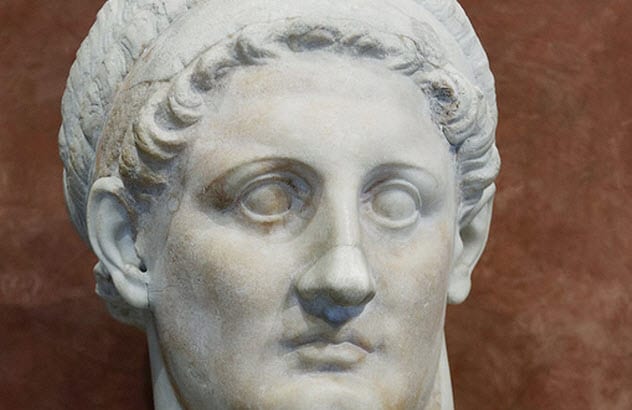
The death of Alexander the Great plunged the ancient world into chaos as many of his generals fought for power in a series of conflicts that lasted almost 50 years and were known as the Wars of the Diadochi (“successors”). Prior to this, though, one general named Perdiccas came closer than anyone to gaining control over the empire of the deceased king.
There were two camps—one wanted rule to be granted to Alexander’s half-brother Arrhidaeus, while the other one thought it should go to his unborn child by Roxana, the future Alexander IV. In the end, the two were named joint kings while Perdiccas served as regent of the empire and commander of the army.
This was just a ploy for Perdiccas to consolidate his power. He began orchestrating the deaths of his opponents. In 323 BC, the generals who supported him were named satraps to various parts of the empire at the Partition of Babylon.
Ptolemy I Soter was given Egypt. His governorship didn’t last long, though. First, he arranged the arrest and execution of Cleomenes, a powerful official who was in Alexandria to serve Perdiccas’s interests. Then he stole Alexander’s body to be buried in Egypt instead of the tomb prepared in Macedonia.
Perdiccas considered this an act of war. He tried to invade Egypt but failed to cross the Nile and lost thousands of men. He was assassinated by his own officers in 321/320 BC. Some historians contend that Ptolemy could have claimed the regency of the empire for himself at this point, but he chose to start his own dynasty in Egypt.[1]
9 Three Intrigues, An Execution, And An Exile
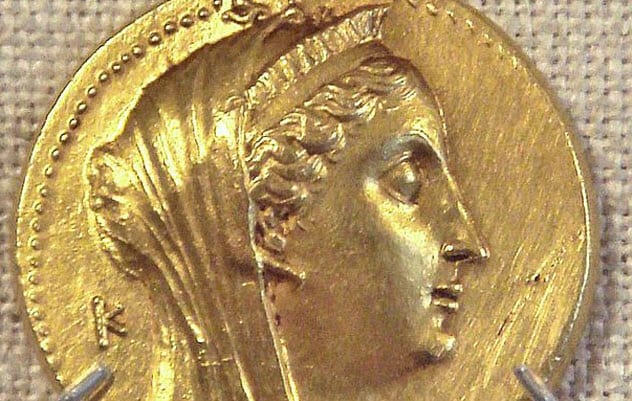
Ptolemy I was followed by his son, Ptolemy II Philadelphus, but it was his daughter, Arsinoe II, who proved to be adept at intrigue and ruthless enough to seize power. The true extent of her influence is debated by historians, but every court she arrived at seemed to have someone quickly lose power in her favor.
Ptolemy II strengthened his rule through two diplomatic weddings with Lysimachus, king of Thrace and another of Alexander’s Diadochi. Circa 299 BC, Lysimachus married Ptolemy’s sister, Arsinoe II, while the pharaoh wed the Thracian’s daughter, also called Arsinoe.[2]
The Ptolemaic Arsinoe gave Lysimachus three sons, but none of them was positioned for the throne as the king already had a son named Agathocles. However, the heir apparent was convicted of treason around 282 BC and executed. Some historians claimed this was the work of Arsinoe to secure the kingship for her sons. This made certain cities in Asia Minor revolt against Lysimachus. The king tried to quell the rebellion but was killed in battle.
Arsinoe then married her half-brother Ptolemy Ceraunus who wanted to strengthen his claim to the kingdoms of Thrace and Macedonia. She may have plotted against him, but the queen’s plan failed and Ceraunus killed two of her sons.
Eventually, Arsinoe made her way back to Egypt. The Thracian Arsinoe, who was her brother’s wife, was soon exiled for planning to murder the king. Again, rumors appeared that the accusations were the work of the pharaoh’s sister. Soon after that, she married her brother and became queen of Egypt.
8 A Purge Of Ptolemies
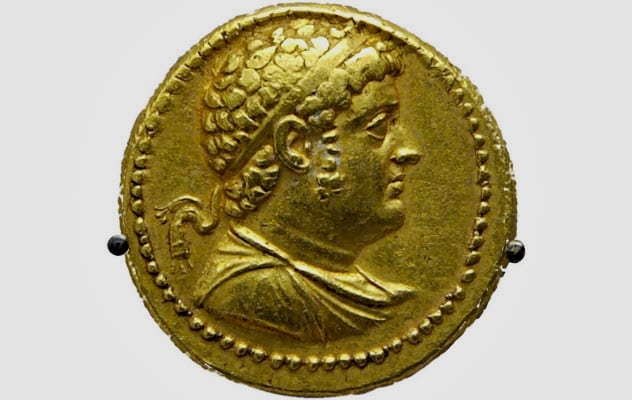
Ptolemaic Egypt is generally considered to have reached its peak during the rule of Ptolemy III Euergetes following his triumphs in the Third Syrian War. Conversely, his son and heir, Ptolemy IV Philopator, was described by historians as a weak ruler who was easily controlled by his associates as long as they indulged his vices. His reign marks the beginning of the decline of the Ptolemaic dynasty.
Ptolemy IV became king of Egypt in 221 BC when he was 23–24 years old. He dedicated himself to a life of debauchery while the administration of the kingdom was mainly handled by his chief minister, Sosibius. The Greek historian Polybius named the minister as the instigator behind the deaths of several of the young pharaoh’s relatives.[3] They included Ptolemy’s mother, Berenice II, as well as his brother, Magas, and his uncle, Lysimachus.
Like his grandfather, Ptolemy IV married his sister, Arsinoe III. She met her demise soon after Ptolemy’s death in 204 BC. This was done by Sosibius and another official called Agathocles to ensure that they would become regents until Ptolemy V came of age.
7 Anything For Power
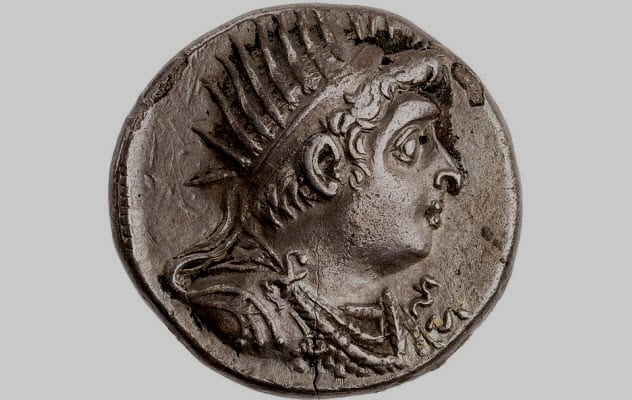
Many members of the Ptolemy family showed themselves capable of ruthlessness and cruelty to ascend to power, but few, if any, outdid Ptolemy VIII Physcon.
He had a decades-long fight for the throne with his older brother, Ptolemy VI Philometor. In 145 BC, the elder Ptolemy died on campaign and his sister-wife, Cleopatra II, wanted her young son, Ptolemy VII Neos Philopator, to rule.
The details of his reign are a bone of contention among historians as some aren’t sure that he ever became king at all. If he did rule, his reign was short-lived. Due to lack of support, Cleopatra had to marry Ptolemy VIII and rule jointly. Once Neos Philopator was deposed, his uncle had him executed.
Once he was in power, Physcon renamed himself Ptolemy Euergetes after his honored ancestor. He married his niece, Cleopatra III, while still married to her mother.
In 131 BC, the elder Cleopatra managed to stage a rebellion against Ptolemy, who left Alexandria with Cleopatra III. They stayed in exile in Cyprus for four years during which Cleopatra II served as regent until her son, Ptolemy Memphites, came of age. This never happened, though, as Ptolemy Physcon was reunited with his son and had him murdered. He then cut off the boy’s head, hands, and legs and had them delivered to Alexandria on Cleopatra’s birthday.[4]
Despite these “squabbles,” Ptolemy and Cleopatra eventually had a public reconciliation and ruled jointly alongside Cleopatra III until Physcon’s death in 116 BC.
6 Violent Ends For Violent People

Certainly, a black eye for the 300-year rule of the Ptolemaic family was the brief but violent reign of Ptolemy XI Alexander II.
He took the throne in 80 BC, succeeding his father, Ptolemy X Alexander I. He also married his father’s wife, Berenice III, who was also his cousin. Before the marriage, there was a brief window where Berenice ruled alone and managed to endear herself to the people of Egypt.[5]
However, her new husband-stepson-cousin didn’t like her. Less than three weeks after getting married, Ptolemy XI had his wife assassinated. This severely angered the people of Alexandria, and a mob stormed the palace and killed the young pharaoh in the Gymnasium.
5 Rome Intervenes
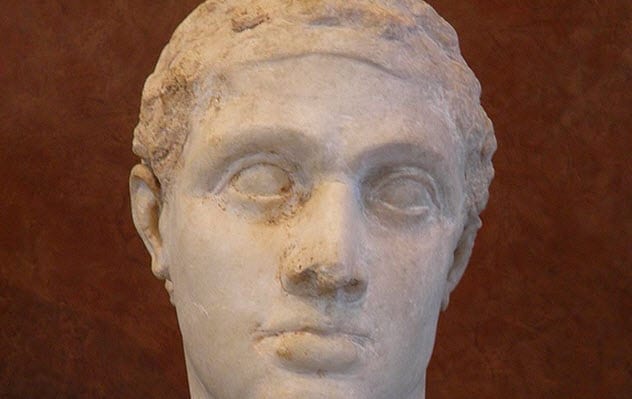
Ptolemy XII Auletes ascended to the throne in 80 BC. By this time, Egypt was a client of Rome and had to pay a substantial tribute which resulted in heavy taxes on the Egyptian people. His popularity reached an all-time low in 58 BC when the Romans took over Cyprus and his brother, King Ptolemy of Cyprus, killed himself.
The people wanted Ptolemy to either demand Cyprus back or denounce Rome. He was unwilling to do either, and a rebellion forced him out of Egypt. He went to Rome where he stayed with Pompey.
While in Rome, there was talk in the Senate of going into Egypt and restoring Ptolemy to the throne. At one point, a delegation of 100 Egyptians, led by philosopher Dio of Alexandria, formed to state their case for the Roman Senate. They intended to present their complaints against Ptolemy.
However, the exiled pharaoh used his money and Pompey’s connections to ensure that no envoy would make it. According to Cassius Dio, most of the messengers were assassinated, including Dio of Alexandria, and those who survived were bribed.
Ptolemy might have succeeded in dealing with one problem through murder, but there was a divine issue which could not be solved with violence.
As they were known to do in times of crisis, the leaders of Rome consulted the oracles. Specifically, they turned to a collection of prophecies known as the Sibylline Books.
According to Cassius Dio, they said, “If the king of Egypt come requesting any aid, refuse him not friendship, nor yet succour him with any great force; else you shall have both toils and dangers.”[6]
4 The March Gabinius
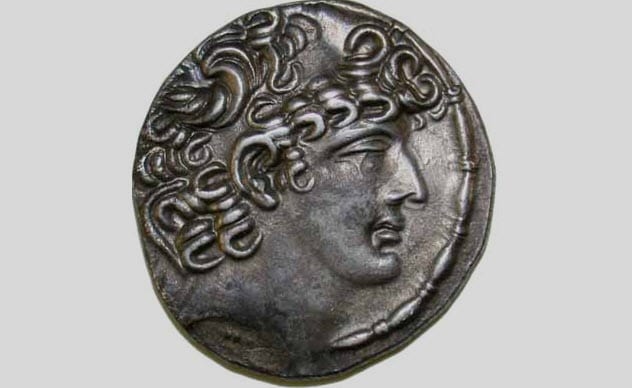
The oracle prophecies made the Roman Senate deny Ptolemy military support. But in the end, it was greed which triumphed over godly resolutions. It was Pompey again who sent one of his generals, Aulus Gabinius, to invade Egypt. He didn’t have Senate approval, but Pompey was powerful enough to avoid consequences.
During Ptolemy’s exile, his daughter, Berenice IV, ruled Egypt. She tried to secure an alliance by marrying Seleucus of Syria. He turned out to be less influential than expected, and Berenice had him killed and married Archelaus.
Her new husband died when Gabinius conquered Alexandria. He reinstated Ptolemy and left him a Roman legion to protect him from future rebellions. They became known as the Gabiniani.
Back on the throne, Ptolemy put his daughter to death.[7] He also killed Egypt’s richest citizens to seize their fortunes as he had a large debt to repay to Gabinius and Pompey.
Alas, Gabinius couldn’t enjoy his plunder for long. The people of Rome were outraged at his defiance of the Sibylline verses and the Senate, and he was arrested when he returned. The most serious charge was high treason.
Through the generous dispersal of influence and bribes, the Roman general was found not guilty. There were other lesser charges, however. Cassius Dio claimed that Gabinius got too confident and too stingy with his bribe purse as he was found guilty. He was exiled, and his property was confiscated.
3 The Murder Of Pompey

In 52 BC, Ptolemy XII named his daughter, Cleopatra VII Philopator, as his coregent. This would be the famous Cleopatra. He wanted her to rule Egypt together with her brother, Ptolemy XIII Theos Philopator. However, the young pharaoh wanted to rule alone, although he was actually under the heavy influence of the eunuch Pothinus, his regent. Together, in 48 BC, they deposed Cleopatra.
Both would-be rulers wanted Roman support, but Rome had its own problems to worry about. By this point, Julius Caesar had started the civil war that would end the republic. He had just earned a decisive victory over Pompey at the Battle of Pharsalus.
Pompey went to Egypt, expecting support and refuge from Ptolemy XIII as he had once provided to the pharaoh’s father. Ptolemy, however, preferred to ingratiate himself with Caesar.
He sent men to greet Pompey under the guise of friendship. But they stabbed him, decapitated him, and threw his body in the water. As far as who committed the deed, Plutarch names two Gabiniani: a former tribune named Lucius Septimius and a centurion named Salvius, alongside Egyptian commander Achillas.[8]
The plan backfired as Caesar was disgusted when presented with the head of Pompey and was said to burst into tears when he received the seal ring of his former friend-turned-rival.
2 War Of The Ptolemies

Whether the assassination of Pompey influenced Caesar is hard to say, but he decided to support Cleopatra. However, he lacked the troops to stage open war. Therefore, he barricaded himself in Alexandria in 47 BC as Ptolemy’s forces, led by Achillas, laid siege to the city.
Another child of Ptolemy XII, Arsinoe IV, got involved in the war as she also had a claim to the throne. She sided with her brother, Ptolemy XIII, but had Achillas put to death and replaced with her tutor, Ganymedes.
Eventually, Caesar received reinforcements from his ally, Mithridates of Pergamum. He was victorious against his rivals at the Battle of the Nile in 47 BC.[9] Ptolemy XIII drowned in the river at age 15 while his sister Arsinoe was first marched through Rome as a prisoner and then banished to the Temple of Artemis in Ephesus. She was later executed at the insistence of Cleopatra.
1 The End Of The Dynasty

Cleopatra regained the throne of Egypt, but Caesar made her rule jointly with another brother, Ptolemy XIV. Their marriage was brief. In March 44 BC, Julius Caesar was assassinated in Rome. Two months later, Ptolemy XIV died in Egypt, and several historians, such as Cassius Dio and Josephus, claimed that he was poisoned by Cleopatra.
If she did kill him, it was so that Cleopatra could position her son as pharaoh. He was Ptolemy XV Philopator Philometor Caesar, better known as Caesarion. As was obvious from his name, Cleopatra was hailing him as the son of Julius Caesar.
With the Roman leader dead, the Egyptian queen took on Marc Antony as her new lover. Antony was part of the political alliance with Octavian and Marcus Lepidus which governed Rome. The alliance was known as the Second Triumvirate.
In 34 BC, Marc Antony enacted the Donations of Alexandria.[10] He bestowed lands and titles upon Cleopatra’s children, which included three of his own by that point.
Crucially, though, he acknowledged Caesarion as the legitimate heir of Julius Caesar. This didn’t sit well with the Romans who felt that Antony had abandoned them in favor of Egypt. Furthermore, Caesarion being considered an heir made him a target for Octavian who was Julius Caesar’s adopted son.
War broke out between Antony and Octavian. The latter won following his victory at the Battle of Actium and subsequent siege of Alexandria. Antony and Cleopatra ostensibly committed suicide, while Caesarion was put to death on Octavian’s orders.
Egypt was annexed and became a province of the Roman Empire. Octavian renamed himself Augustus Caesar and became the first Roman emperor. Thus ended the story of Marc Antony and Cleopatra and the rule of the Ptolemies in Egypt.
Read more fascinating facts and riddles about ancient Egypt on Top 10 Recent Riddles And Revelations From Ancient Egypt and Top 10 Fascinating Facts About Ordinary Ancient Egyptians.








